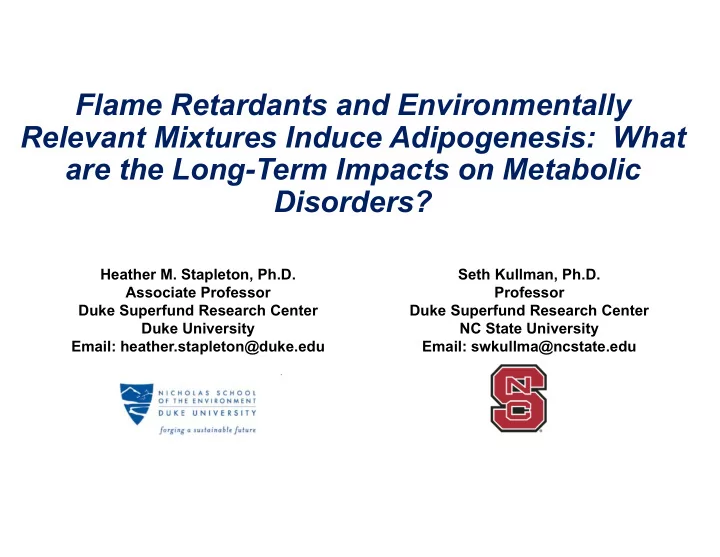

Flame Retardants and Environmentally Relevant Mixtures Induce Adipogenesis: What are the Long-Term Impacts on Metabolic Disorders? Heather M. Stapleton, Ph.D. Seth Kullman, Ph.D. Associate Professor Professor Duke Superfund Research Center Duke Superfund Research Center Duke University NC State University Email: heather.stapleton@duke.edu Email: swkullma@ncstate.edu
Developmental Origins of Health And Disease (DOHAD) www.dohadfordoctors.com • Strong link between perinatal and early childhood factors and risk of chronic disease (e.g. heart disease, diabetes, obesity, etc) • But what chemical exposures are most important to research? 2
Research Questions? • How do halogenated and organophosphate based organic contaminants affect: • Thyroid hormone regulation • Adipogenesis • Osteogenesis • Will exposure to environmentally relevant mixtures (e.g. house dust) impact these pathways?
Adipogenesis Assay Measures Triglyceride accumulation AdipoRed ‐ hydrophilic fluorescent dye (Nile Red) Partitions into lipid droplets in the cells, fluoresces Cell proliferation/cytotoxicity NucBlue DNA dye (Hoechst 33342) Partitions into nuclei and fluoresces upon binding DNA
Adipogenesis Assay Measures Triglyceride accumulation AdipoRed ‐ hydrophilic fluorescent dye (Nile Red) Partitions into lipid droplets in the cells, fluoresces Cell proliferation/cytotoxicity NucBlue DNA dye (Hoechst 33342) Partitions into nuclei and fluoresces upon binding DNA
Flame Retardants and Adipogenesis Chris Kassotis, PhD Kassotis et al. 2017, ES&T
Adipogenesis “Phenotypes” Observed in Dust Extracts High triglyceride accumulation Minimal pre-adipocyte proliferation Minimal triglyceride accumulation High pre-adipocyte proliferation Kassotis et al. 2019, STOTEN
Health Outcomes and Adipogenic Activities of House Dust • Performed regressions controlling for sex, age, race, and education as potential confounders. • Using both efficacy and potency of triglyceride accumulation/ proliferation metrics • Triglyceride accumulation efficacy was significantly associated with resident BMI. Kassotis et al. 2019, STOTEN
Putative Role of Thyroid Receptor β Antagonism in Adipogenic Activity • GR (dexamethasone) and PPARγ (rosiglitazone) are potent and efficacious regulators of adipogenesis. • 1‐850 (non‐specific TRβ isoform antagonist) also significantly promotes adipocyte differentiation. • Triglyceride accumulation (3T3‐L1 cells) significantly correlated with TRβ antagonism in dust extracts (r s = 0.447; p<0.001). • Not correlated with pre‐adipocyte proliferation Kassotis et al. 2017, Sci Rep Kassotis et al. 2019, STOTEN
Contributory Role of TR β Antagonism in Adipogenic Activity • Two experiments bolster causative link between TRβ and triglyceride accumulation in 3T3‐L1 cells: • Ligand recovery experiment. Dust + T3 (TR agonist): • Addition of T3 inhibited dust‐ induced triglyceride accumulation for 7 of 9 samples. • siRNA knock‐down of TR /β: • TR knock‐down inhibited dust‐ induced triglyceride accumulation for 7 of 9 samples (two trending). Kassotis et al. 2019, STOTEN
Are Chemical Mixtures in House Dust “Active”? Kollitz et al. 2018, ES&T
Are Chemical Mixtures in House Dust “Active”? Figure 4B . Spearman correlation between TRb antagonism of house dust vs serum T4 levels of residents Kollitz et al. 2018, ES&T
What about osteogenesis?
Is There a Developmental Basis of Adult Bone Disease? • Peak bone mass achieved during childhood/puberty • Important determinants of bone mass and fracture risk later in life • May contribute to adult degenerative bone diseases
Is There a Developmental Basis of Adult Bone Disease? • Peak bone mass achieved during childhood/puberty • Important determinants of bone mass and fracture risk later in life • May contribute to adult degenerative bone diseases Can Environmental Exposures Contribute to Osteochondral-Dysplasia & Degenerative Disease?
TCDD induced osteochondral phenotypes
TCDD Recapitulates human skeletal disease Shared targets between congenital skeletal dysplasias and embryonic TCDD exposure.
TCDD Recapitulates human skeletal disease Shared targets between congenital skeletal dysplasias and embryonic TCDD exposure.
TPP& FM 550 Osteochondral Phenotypes Tg(Col10a11‐GFP) Alizarin Complexone FM 550 treated medaka display increased IVR, deformed centra, reduced hypural cartilage decrease in col10a1 expression/localization throughout the caudal fin and axial spine
TPP & FM 550 Osteochondral Phenotypes TG (Twist‐GFP) Alizarin Complexone Treated medaka display increased IVR and displaced expression of twist+ cells within IVR, some evidence of twist + cells within the calcifie centrum
Human Mesenchymal Stem Cells TCDD Induces Loss of Osteogenic Differentiation
Human Mesenchymal Stem Cells TCDD Induces Loss of Osteogenic Differentiation
TCDD Modulates MSC Commitment/Differentiation
TCDD Modulates MSC Commitment/Differentiation
TCDD Modulates MSC Commitment/Differentiation
TPP: Attenuates Osteogenic Differentiation hMSC
TPP: Induces Formation of Adipocytes Under Osteogenic Conditions hMSC
TPP + Insulin: Enhances Adipocyte Formation Under Osteogenic Conditions hMSC TPP 10 µM ODM control + insulin + insulin
MSC Multipotency – a Cellular Seesaw in Response to Endogenous/Exogenous Agents
MSC Multipotency – a Cellular Seesaw in Response to Endogenous/Exogenous Agents TCDD ? ? MSCs BONE ADIPOSE
MSC Multipotency – a Cellular Seesaw in Response to Endogenous/Exogenous Agents TCDD FM 550, TPP ? ? ? PPARg AhR CAR MSCs Erb AR BONE BONE ADIPOSE ADIPOSE
A few salient points… • Developmental exposures to FRs can significantly disrupt cartilage, bone morphogenesis in vivo. • Phenotypes in SAF serve as excellent models for linkage of phenotypic and molecular changes that may mimic select skeletal dysplasia / diseases. • FRs likely impact cell lineage progression and/or differentiation of MSCs with varying mechanisms. • In process of identifying FR targets including NR’s, and other proteins in collaboration with CPI.
Acknowledgements Stapleton Lab Kullman Lab • Christopher Kassotis, PhD • AtLee Watson, PhD • Erin Kollitz, PhD • Stacy Schkoda • • Kate Hoffman, PhD Chris Kassotis, PhD • Megan Knuth • Lee Ferguson, PhD • Melissa Gronske • Allison Phillips, PhD • Morgan Ritter • Stephanie Hammel, PhD • Kirsten Overdahl Sean Ekins, PhD. Collaborations • Samantha Hall Pharmaceutical Inc . • Emina Hodzic • Matt Ruis • Sharon Zhang Grants: NIH: P42 ES010356 NIH: T32 ES007046 NIH: P30 ES025128 33
Recommend
More recommend